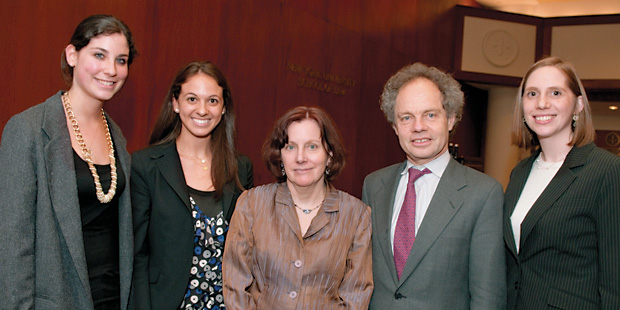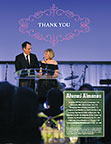A Labor Force of One
The new No. 3 at the U.S. Department of Labor brings a relentless, lifelong defense of worker rights.
Printer Friendly VersionWhen wild mushrooms appear in the woods behind her upstate weekend cabin, M. Patricia Smith ’77, the newly installed solicitor of the U.S. Department of Labor, heads out to pick the delicacies. “I’ve taught myself which ones you can eat and which ones you can’t,” she says. But navigating the tricky terrain of Washington, D.C., has proven a bit tougher.
In her 20 years at the New York State Attorney General’s office and three years as commissioner of the New York State Department of Labor, Smith fought effectively to enforce fair-wage and other labor laws. The New York Times called her “one of the nation’s foremost labor commissioners.” But Smith, 57, stepped into the No. 3 post at the Labor Department only after a bruising 11-month confirmation battle. “It’s been an unexpectedly difficult process,” she says. Now the transplanted Brooklynite is looking forward to waging battles of her own in the courtroom.
Smith traces her affinity for helping workers to her upbringing in western Pennsylvania’s mining country, where her grandfather was the coal miners’ principal doctor. Often the men he tried to save after a mine disaster were men he’d delivered as babies. Her father, Perry, 81, also a doctor, treated coal miners and their families, too. “We were always around the coal mines,” says Smith. “I was influenced by the dangerousness of the work and the job that the unions were doing on the workers’ behalf.”
She graduated from Trinity College in Washington, D.C., in 1974 with a degree in political science. Ruling out medicine after fainting at the sight of blood, Smith turned to law, choosing NYU because of the school’s commitment to public interest law. She chaired the Law Women, which honored her in February as its 2010 alumna of the year, and took every labor law class NYU offered. “I was always drawn to the world of work,” she says. “When I go into a restaurant I wonder, Is the tip going to the waiter? When I walk into my dry cleaner I ask myself, Is the person behind the counter getting the minimum wage?”
She began her career as a legal aid lawyer, then joined the New York AG’s office in 1987. As part of the Labor Bureau, where she rose through the ranks to chief in 1999, she won two cases before the U.S. Supreme Court and built a reputation for championing underpaid workers.
Along with then-Attorney General Eliot Spitzer, Smith went after grocery store chains for violating minimum wage and overtime laws, recouping $6 million in 2000 for Food Emporium and Gristedes delivery men, who had been earning just $2 an hour. In 2001, her office won $315,000 in back pay from three greengrocers and persuaded another 200 to sign an agreement of compliance. In 2004, she led a crackdown on Royal Flush Bathroom Attendants, a service that supplied workers to dozens of Manhattan restaurants and nightclubs. Not only did the employees earn only tips, but they also had to return a percentage of the money to Royal Flush. That same year, she helped win $450,000 for pushcart vendors in Central Park, who often made just $60 a day selling hot dogs, pretzels, and ice cream.
When she became the state’s labor commissioner in 2007, Smith continued to lean on employers, recovering a record $50 million in back pay before leaving office in February 2010. “Some small business owners felt she was too aggressive. But you have to get the bad apples out of the system,” says Ken Adams, president of the Business Council of New York State. “We didn’t agree on every issue, but she was an honest broker, direct and sincere in her desire to hear both sides of the story.”
In January 2009, Hilda Solis, the U.S. secretary of labor, asked Smith to be solicitor. “I said yes. Then I sat down and cried,” she recalls. “I had a home in Brooklyn, parents to take care of, and I was very happy with the job I had.” But the post would allow her to do more lawyering and less policymaking—a welcome change.
Not long afterward, her appointment hit a roadblock. In August, Republican Sen. Mike Enzi of Wyoming asked the president to withdraw the nomination on the grounds that Smith had misled a Senate committee about her Wage and Hour Watch program at the New York State Department of Labor. The program was modeled on a neighborhood watch, and encouraged community groups and labor unions to look out for wage violations. Enzi argued the program “endow[ed] union organizers and community activist groups…with vigilante power.” Smith countered that the program was designed to raise awareness of labor laws, not to enforce them. The Senate confirmed her in February 2010 by a 60-to-37 vote.
As solicitor, Smith will oversee 500 lawyers working on occupational safety, wage and hour standards, and unemployment insurance benefits. She’ll handle a mix of litigation, representing plaintiffs and defendants, as well as appellate work. “I get to be a lawyer again. I like analyzing cases, figuring out how to use the law to get from A to B,” she says. And besides, she adds, “I have a feeling that maybe I’m needed there.”
—
All of 2010 Alumni Almanac


 Multimedia
Multimedia